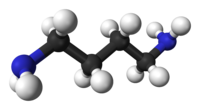
Photo from wikipedia
One of the most relevant aspects in evaluating the impact of natural bioactive compounds on human health is the assessment of their bioavailability. In this regard, abscisic acid (ABA) has… Click to show full abstract
One of the most relevant aspects in evaluating the impact of natural bioactive compounds on human health is the assessment of their bioavailability. In this regard, abscisic acid (ABA) has attracted particular interest as a plant-derived molecule mainly involved in the regulation of plant physiology. Remarkably, ABA was also found in mammals as an endogenous hormone involved in the upstream control of glucose homeostasis, as evidenced by its increase after glucose load. The present work focused on the development and validation of a method for the determination of ABA in biological samples through liquid–liquid extraction (LLE), followed by liquid mass spectrometry (LC-MS) of the extract. To test method suitability, this optimized and validated method was applied to a pilot study on eight healthy volunteers’ serum levels to evaluate ABA concentration after consumption of a standardized test meal (STM) and the administration of an ABA-rich nutraceutical product. The results obtained could meet the demands of clinical laboratories to determine the response to a glucose-containing meal in terms of ABA concentration. Interestingly, the detection of this endogenous hormone in such a real-world setting could represent a useful tool to investigate the occurrence of impaired ABA release in dysglycemic individuals and to monitor its eventual improvement in response to chronic nutraceutical supplementation.
Journal Title: Foods
Year Published: 2023
Link to full text (if available)
Share on Social Media: Sign Up to like & get
recommendations!